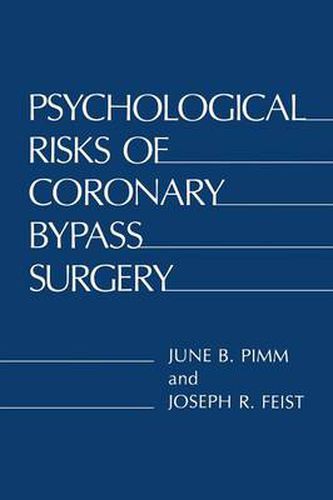Readings Newsletter
Become a Readings Member to make your shopping experience even easier.
Sign in or sign up for free!
You’re not far away from qualifying for FREE standard shipping within Australia
You’ve qualified for FREE standard shipping within Australia
The cart is loading…






This title is printed to order. This book may have been self-published. If so, we cannot guarantee the quality of the content. In the main most books will have gone through the editing process however some may not. We therefore suggest that you be aware of this before ordering this book. If in doubt check either the author or publisher’s details as we are unable to accept any returns unless they are faulty. Please contact us if you have any questions.
Heart surgery is still a relatively recent advance in medical technology. The first open-heart procedure was closure of an atrial septal defect in a child at the University of Minnesota Hospital in 1953. This issued in a life-saving advance, the use of which has expanded enormously to in clude treatment of many areas of cardiac disease. Not unexpectedly, surgical techniques allowed through the use of the heart-lung machine (open-heart surgery) came to be applied in 1967 to the major killer of Americans, namely, coronary artery disease. This operation, known as coronary artery bypass, has become one of the most common surgical operations. Coronary artery disease, with the possibility of total incapacitation or sudden death from a heart attack, can alter severely the personality of the patient. Corrective surgery can sometimes intensify rather than ame liorate a patient’s fears. To the surgeon, occupied by increasing numbers of patients, there is not time enough to give the preoperative attention that might be helpful. Also, the surgeon and cardiologist are limited in their ability to recognize those patients near the breaking point. The research outlined in these chapters by Drs. Pimm, Feist, and their associates is welcomed by cardiologists and cardiac surgeons. It provides insight into what appears to be reliable recognition of those patients likely to have an adversely affected mental status by coronary bypass surgery and crisis intervention to avert this effect and allow the complete benefit of returning the patient to a normal life.
$9.00 standard shipping within Australia
FREE standard shipping within Australia for orders over $100.00
Express & International shipping calculated at checkout
This title is printed to order. This book may have been self-published. If so, we cannot guarantee the quality of the content. In the main most books will have gone through the editing process however some may not. We therefore suggest that you be aware of this before ordering this book. If in doubt check either the author or publisher’s details as we are unable to accept any returns unless they are faulty. Please contact us if you have any questions.
Heart surgery is still a relatively recent advance in medical technology. The first open-heart procedure was closure of an atrial septal defect in a child at the University of Minnesota Hospital in 1953. This issued in a life-saving advance, the use of which has expanded enormously to in clude treatment of many areas of cardiac disease. Not unexpectedly, surgical techniques allowed through the use of the heart-lung machine (open-heart surgery) came to be applied in 1967 to the major killer of Americans, namely, coronary artery disease. This operation, known as coronary artery bypass, has become one of the most common surgical operations. Coronary artery disease, with the possibility of total incapacitation or sudden death from a heart attack, can alter severely the personality of the patient. Corrective surgery can sometimes intensify rather than ame liorate a patient’s fears. To the surgeon, occupied by increasing numbers of patients, there is not time enough to give the preoperative attention that might be helpful. Also, the surgeon and cardiologist are limited in their ability to recognize those patients near the breaking point. The research outlined in these chapters by Drs. Pimm, Feist, and their associates is welcomed by cardiologists and cardiac surgeons. It provides insight into what appears to be reliable recognition of those patients likely to have an adversely affected mental status by coronary bypass surgery and crisis intervention to avert this effect and allow the complete benefit of returning the patient to a normal life.